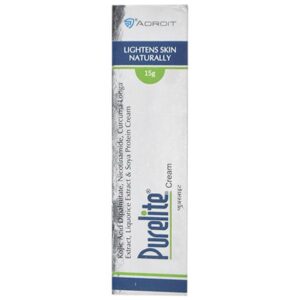NICOINAMIDE + KOJIC ACID + TURMERIC (CURCUMA LONGA)
Nicoinamide: Nicotinamide, also known as niacinamide, is a drug used for the treatment and prevention of vitamin B3 deficiency. It is an essential nutrient that plays a role in various metabolic processes in the body.
Mechanism of action: Nicotinamide is a precursor of nicotinamide adenine dinucleotide (NAD) and nicotinamide adenine dinucleotide phosphate (NADP), which are coenzymes involved in cellular metabolism. It functions as a cofactor for various enzymes that are essential for processes such as energy production, DNA repair, and cell signaling.
Use: Nicotinamide is primarily used to prevent and treat niacin deficiency, which can result in a condition known as pellagra. Pellagra is characterized by symptoms such as dermatitis, gastrointestinal issues, and neurological abnormalities. Additionally, nicotinamide is used as an adjunct treatment for certain skin disorders like acne, rosacea, and bullous pemphigoid.
Dose: The recommended dose of nicotinamide depends on the specific condition being treated. For niacin deficiency, the typical adult dose ranges from 50 to 100 mg orally, two to three times per day. For skin disorders, the dose may vary and should be determined by a healthcare professional.
Side effects: Nicotinamide is generally considered safe when taken at recommended doses. Common side effects include nausea, diarrhea, vomiting, and stomach upset. These side effects are usually mild and temporary. In rare cases, allergic reactions may occur, which can manifest as rash, itching, or swelling.
It’s important to note that nicotinamide is different from niacin, also known as vitamin B3, although they are both forms of vitamin B3. Nicotinamide does not typically cause the flushing effect that niacin can cause at high doses.
Kojic Acid: Kojic acid is a naturally occurring substance that is used primarily in skincare products. It is derived from several different species of fungi and is known for its skin-lightening properties.
Kojic acid is used topically to treat conditions such as hyperpigmentation, melasma, and age spots. It is also used as an ingredient in certain cosmetic products to help lighten areas of the skin that have been darkened due to sun exposure or other factors.
The mechanism of action of kojic acid is by inhibiting the production of melanin, the pigment responsible for giving color to the skin. It does this by inhibiting the activity of tyrosinase, an enzyme involved in the production of melanin. This leads to a decrease in melanin production and a lightening of the skin.
Kojic acid is usually available in the form of creams, lotions, or serums. The concentration of kojic acid in these products can vary, and it is important to follow the instructions provided on the packaging or as directed by a healthcare professional.
The typical recommended dose of kojic acid for topical use is to apply a thin layer to the affected areas of the skin twice daily. It is advisable to start with a lower concentration and gradually increase if needed, to minimize the risk of skin irritation.
While kojic acid is generally considered safe when used as directed, it can cause skin irritation, redness, and dryness, especially in individuals with sensitive skin. Some individuals may also experience contact dermatitis or allergic reactions. It is important to perform a patch test on a small area of skin before applying kojic acid to larger areas.
It is also worth noting that kojic acid may increase the skin’s sensitivity to the sun, so it is crucial to use sunscreen and avoid excessive sun exposure to prevent further damage to the skin.
As with any medication or skincare product, it is advisable to consult with a healthcare professional or dermatologist before using kojic acid to ensure it is suitable for your specific needs and to discuss any potential side effects or interactions with other medications or products.
Turmeric (curcuma Longa): Turmeric, also known as Curcuma Longa, is a yellow spice commonly used in cooking. It has been used for centuries in traditional medicine for its potential health benefits. Turmeric contains a chemical compound called curcumin, which is believed to be responsible for its therapeutic properties.
Use:
Turmeric is used for its anti-inflammatory, antioxidant, and anticancer properties. It has been studied for its potential in treating various health conditions, including arthritis, digestive disorders, liver diseases, skin problems, and mental health issues. It is also commonly used as a dietary supplement.
Mechanism of Action:
Curcumin, the active compound in turmeric, exerts its pharmacological effects through multiple mechanisms. It has been shown to inhibit various pro-inflammatory enzymes, reduce oxidative stress, modulate signaling pathways involved in inflammation and cell proliferation, and inhibit the growth of cancer cells. However, the exact mechanisms of action of curcumin are still being studied and understood.
Dose:
There is no standard recommended dose of turmeric or curcumin. However, for general health benefits, doses of 500-2,000 mg of curcumin per day are commonly used in clinical studies. It is important to note that the bioavailability of curcumin is low, so it is often taken with other compounds (such as piperine from black pepper) to enhance absorption.
Side Effects:
Generally, turmeric is considered safe when used in moderate amounts as a spice in food. However, high doses of curcumin or long-term use of turmeric supplements may cause some side effects. These can include gastrointestinal symptoms such as nausea, diarrhea, and indigestion. Some individuals may also experience allergic reactions or skin rashes. Turmeric may also interfere with certain medications, so it is advisable to consult a healthcare professional before starting any new supplement regimen.
It is important to note that turmeric or curcumin supplements are not a substitute for medical treatment, and it is always recommended to consult with a healthcare professional before starting or changing any treatment plan.

